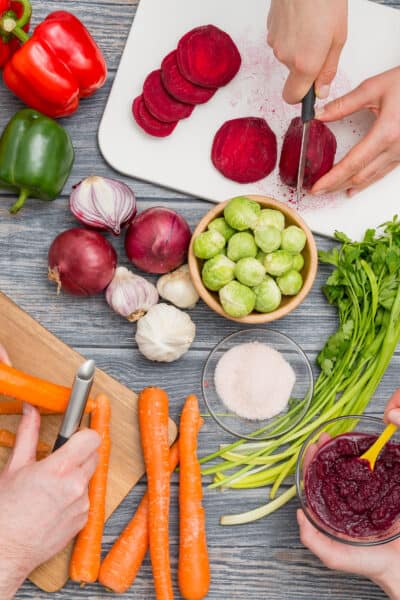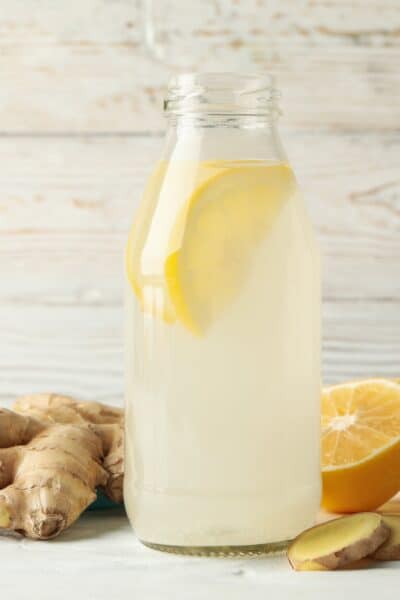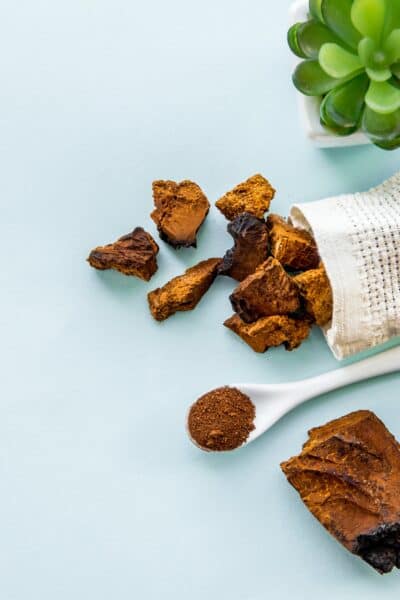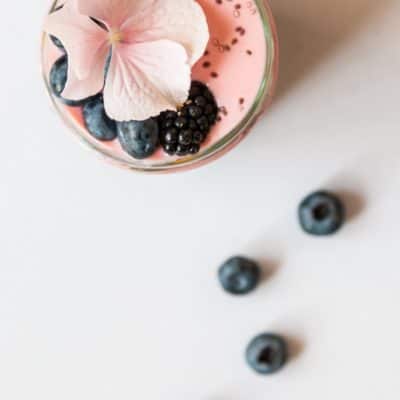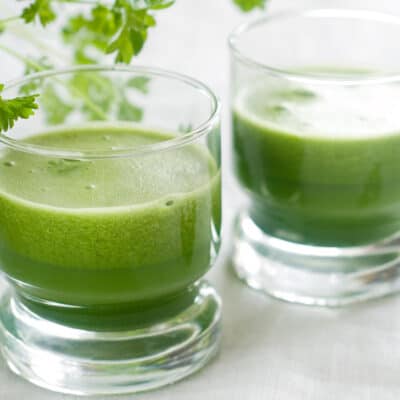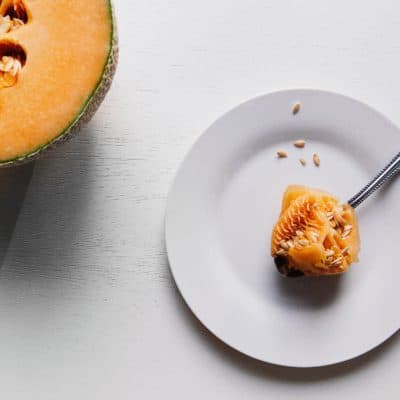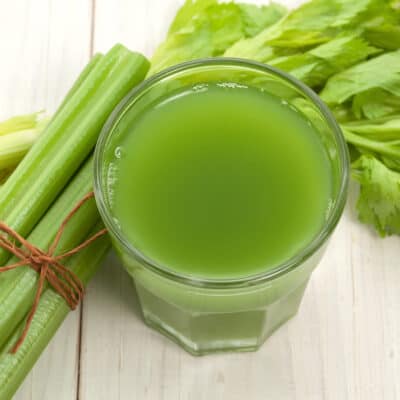Check out my Vegan For 30 Days program with meal plans, recipes, tips and motivation – all for just $1/day.
When someone hears you’re going plant-based, often their first concern is: “Where do you get your protein?”
While playing in the NFL, lineman David Carter (Arizona Cardinals, Dallas Cowboys, Chicago Bears) was under a regime of medications for a range of conditions including high blood pressure, tendonitis, and early onset arthritis. Even though he was an elite athlete in his twenties, David never felt more sick. He was convinced to go plant-based after watching the Forks Over Knives film, and experienced a waterfall of health benefits.
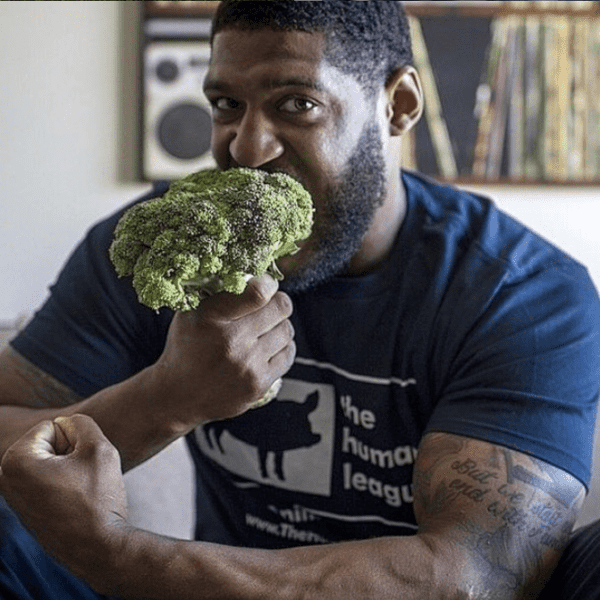 “Within a week I was sleeping better,” he says in an interview. What’s more, even getting his protein sources purely from plants, he began seeing improvements in his athletic performance.
“Within a week I was sleeping better,” he says in an interview. What’s more, even getting his protein sources purely from plants, he began seeing improvements in his athletic performance.
“I got stronger, faster, and had no health issues,” he said.
While he was eating meat, David had experienced tendonitis that prevented him from lifting more than 315 pounds on a bench press. After he switched to being plant-based, the tendonitis disappeared and his bench shot up to 450 pounds, and his leg press increased to 1,800 pounds for a set of 10 (the weight of a small car).
In an IGTV video, David says, “I did some research and realized that… gorillas don’t eat meat, elephants don’t eat meat, horses don’t eat meat.. And they’re bigger than us, faster than us, stronger than us – why don’t we do that?”
David is known as “The 300 Pound Vegan” and is now a motivational speaker advocating for vegan health and animal rights.
David isn’t wrong – all protein originates in plant form, so we can get it from the same source that animals get it: plants! All we need to do is cut out the middleman, so to speak.
But is the protein from a plant-based diet enough? If you’re working out or an athlete, don’t you need to eat meat to build muscle? How about if you’re pregnant or breast-feeding? Or if you have a growing child? Here’s what you need to know:
How Protein Became More Important Than Any Other Nutrient
Protein became a sort of buzzword around the 1930s, and all of a sudden the determination between “healthy” and “not healthy” was simply a question of whether or not it contained protein. There was no discussion on the quality of the protein, the ability or inability of your body to absorb certain proteins, and what else that protein brought into your body with it. Even though we as a society have been able to critically ask questions about other topics and even other nutrients, protein defenders have laid down the hammer on anyone questioning meat as the best vehicle to get your protein. Even in the face of peer-reviewed research that proves otherwise, many have staunchly repeated the antiquated idea that if you’re not eating meat, you’re not getting enough protein.
Here’s a summary of the history of protein, from a research perspective – plus, some surprising findings:
The Questions You Should Be Asking About Protein
Science and research have evolved past whether or not a food contains protein – we now know what kind of protein is best, how much, and how our bodies use it. The growing body of research that is pointing toward plant-based foods as the highest quality protein sources is somehow slower in reaching common knowledge in society.
WHY DO OUR BODIES NEED PROTEIN?
Our bodies demand many different kinds of proteins – not just the kind for our muscles. Proteins are made up of chains of amino acids, and different amino acids make up different proteins that are used for varying purposes around the body. Proteins are used for metabolic exchanges, replicating DNA, transporting molecules, helping build cellular structures for different parts of the body – from your eyeballs to knee joint tissue – and many other functions. Such a diverse need for proteins requires a diverse supply of amino acids – so why are we only recommended to get our protein from just a few different sources? What builds amino acids in the body? We’ll talk about that more below, but spoiler alert: your body needs the wide array of minerals found in plant foods to create amino acids, in order to build the proteins your body needs.
DOES THE SOURCE OF YOUR PROTEIN MATTER?
Protein is inherent in plants – it’s what helps the plant build cell structures and grow. The animals typically raised in the meat industry for consumption are biologically designed to eat plants. The animal then synthesizes the protein in its body and uses it to do things such as grow bones and muscle. When we consume animal meat, it contains protein that has already been synthesized. Instead of getting your protein “processed” by an animal, why not go straight to the original source?
Protein from animals comes with hormones (plus, often additional foreign injected hormones), fat, and inflammatory compounds. Protein from plants comes with antioxidants, vitamins, minerals, fiber, anti-inflammatory compounds, phytochemicals, and a variety of other nutrients beneficial for your body. Most importantly, the nutrients in plants are able to be better absorbed by your body because they aren’t coming with fat, hormones, and inflammation. It’s not just what you eat, it’s if – and how – you absorb it.
Studies confirm that consuming foods high in animal protein, fat, dairy, and eggs is linked to cancer, inflammation, type 2 diabetes, cognitive decline, early death, and more. When you can get the same or even better quality of protein from plant sources – which are linked to the lowest risk of cancer, reducing inflammation, weight loss, improved cognitive function, greater longevity, and more – why not do it?
HOW MUCH PROTEIN DO YOU REALLY NEED?
Do we get enough protein? Here’s what the science says, in less than 5 minutes:
As Dr. Gregor explains, yes – we do! People of all diets (excepting those who are extremely calorically restricting their intake) get more than the daily recommended amount.
However, we are lacking in fiber and minerals – which are the nutrients that build amino acids, and amino acids build protein.
So really, the concern when transitioning to a plant-based diet should not be about protein, but instead about macro-minerals and micro-minerals.
If you’re eating whole plant foods (fruits, vegetables, certain grains, etc) you won’t have trouble getting fiber, minerals, protein, or almost any other nutrient. (Though due to soil depletion and other factors, I often recommend these 5 basic supplements).
WHAT ARE THE LONG-TERM EFFECTS OF KETO AND PALEO DIETS?
The new health trends storming the diet world promote eating things that come from and live on the earth (paleo) or eating a low-carb high-fat (keto) to lose weight. Many have indeed lost weight due to these diets – but it is important to take a deeper look. Both diets encourage cutting out highly processed foods, which is a main reason why so many people see immediate success for weight loss. However, the long-term internal damages that can result from such diets can lead to poor health outcomes later on, including greater risk for premature death, heart disease, stroke, and cancer. For example, a high fat diet (whether animal- or plant-based) overburdens the liver, an organ already working overtime to save the rest of our bodies from bacteria, viruses, and toxins. When the liver has too much work to do and not enough resources, it begins shutting down certain functions in order to reserve itself for the most vital tasks. With only a partially functioning liver, the body can easily succumb to viruses, heart failure, cancer, and more. High fat can also cloud up the blood, making it more difficult for the circulatory system to get blood to the heart and brain. There are more than a few flaws in the keto and paleo movements – and if you’re looking to lose weight, research says a whole food plant-based diet is the fastest, healthiest way to do so.
DOES PROTEIN ACTUALLY CURB HUNGER?
Worried about feeling hungry if you cut out animal protein? Don’t make the mistake of thinking it’s protein that’s filling you up – it’s the calories. Animal protein comes with higher calories, so no wonder you get full fast – and stay full because your body has to work extra hard, for longer, to digest animal products.
So how do you feel full on a plant-based diet? One of the biggest mistakes people make while transitioning to a plant-based diet is not consuming enough calories. Plant foods are lower in calories than animal products, so you will have to eat more of them to stay full.
Plant foods that are dense in calories can help you while traveling, on the go, or on a budget. Here are a few examples:
- Dates
- Bananas
- Apples
- Brussel sprouts
- Potatoes
- Squash
- Papaya
Tip: Snack often, and snack well. Your body digests fruits and vegetables easily, which gives you so much more energy to live your life! This also means you must keep nourishing your body throughout the day, so snack often (every 1.5-2 hours). You must also snack well, meaning don’t reach for crackers – reach instead for foods high in minerals, such as cucumbers, dates, mangoes, etc.
WHAT’S THE IMPACT OF ANIMAL PROTEIN ON OUR PLANET?
By now, it’s no secret that the meat, dairy, and egg industries aren’t doing our planet any favors. Stanford researchers found that raising livestock takes up more than a fourth of Earth’s total landmass (and the feed takes up a third of Earth’s arable land), and are responsible for the deforestation of many areas, including the Amazon. In fact, many major meat (and soy) companies are directly involved in deforestation and the Amazon wildfires. Another study documents that beef, by far, uses the most resources (land, water, feed, space, etc.) to produce than dairy, poultry, pork, and eggs. The same study warns that the egg and dairy industries are also at fault – the feed needed for milking cows and laying hens causes the earthly cost of producing dairy & egg products to skyrocket. The livestock sector is responsible for approximately 18 percent of all greenhouse gas emissions worldwide – and this, combined with toxic runoff from feedlots, feed crops, and pesticides that contaminate our water, contributes to our planet’s decline.
Forbes magazine stated that going plant-based (avoiding meat, dairy, eggs, and other animal products) is the single most significant thing one can do for the planet. Not sure how much one person can affect the earth? By going plant-based for 1 day, you save:
- 1100 gallons of water
- 30 square feet of forest
- 1 animal life
- 40 pounds of grain
- 20 pounds of CO2
This study found that eating a plant-based diet significantly reduces greenhouse gas emissions. In fact, a major 2018 study confirms that a diet rich in fruits and vegetables is best for the planet – particularly if you go organic.
ARE FAKE MEATS A GOOD PROTEIN SOURCE?
Faux-meats like the Impossible Burger and Beyond Meat may taste good and “like the real thing,” but I cannot recommend them. These are highly processed foods that often have a long list of ingredients that I wouldn’t personally put into my body. In my home experience with my family and in my practice with my clients, what I’ve seen over and over is that the closer we eat to nature and the fewer processed foods we consume, the stronger our health and our bodies are.
Homemade plant-based burgers can be delicious and wholesome as well as simple to make. I have a few tasty recipes in my online course that helps people transition to a plant-based diet, and there are many others easily found online. “Carrot dogs” are also having a moment in the whole-food plant-based food scene as well.
In general, don’t be duped into thinking that everything advertised as “plant-based” is healthier for you. Be discerning in what you eat – turn the package over and look at the ingredients! Check out 3 Mistakes To Avoid When Going Plant-Based.
WHAT PLANT FOODS ARE SIGNIFICANT SOURCES OF PROTEIN?
Ah, the age-old question someone who eats plant-based will be asked at one point…”Where do you get your protein?” To lay your mind at ease, almost every vegetable has all the essential amino acids to make protein, in varying amounts. So if you are eating a variety of fruits, vegetables, and grains, you will easily get the daily recommended amount of protein – along with other amazing vitamins, minerals, and nutrients. Contrary to popular belief, “Vegans have not been shown to be deficient in protein intake or in any specific amino acids,” says Heather Fields, M.D., Community and Internal Medicine at Mayo Clinic in Arizona.
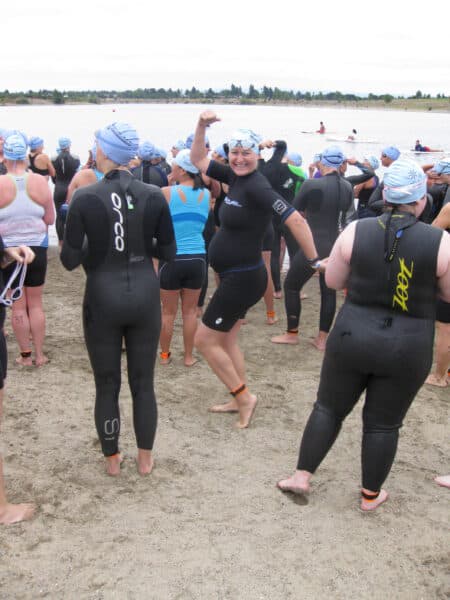 If you’re an athlete or following an exercise regimen, don’t worry about missing out on building muscle or keeping up with the competition. Research says you’ll do just as well – and sometimes, even better – than athletes who consume meat. I completed a triathlon when I was 7 months pregnant with my second child while being vegan! Other triathletes who were meat eaters and not pregnant were trying to keep up.
If you’re an athlete or following an exercise regimen, don’t worry about missing out on building muscle or keeping up with the competition. Research says you’ll do just as well – and sometimes, even better – than athletes who consume meat. I completed a triathlon when I was 7 months pregnant with my second child while being vegan! Other triathletes who were meat eaters and not pregnant were trying to keep up.
Tip: Replace that powdered “post-workout protein” with spirulina or barley grass juice powder. About 60% of spirulina’s dry weight is protein, and it provides all of the amino acids needed for your body to build the proteins it needs. Learn more about spirulina here.
Plant-based athletes have recently been coming into the spotlight, including world record holding strongman Patrik Baboumian, U.S. Olympian Dotsie Bausch, record-holding ultramarathoner Scott Jurek, Australian track champion Morgan Mitchell, and many more. I recommend watching the recent documentary Game Changers (available on Netflix) to learn how eating whole-food plant-based helped them become elite athletes.
Here are some top plant sources of protein:
- Spirulina
- Barley grass juice powder
- Cauliflower
- Spinach
- Sprouts
- Asparagus
- Brazil nuts
- Broccoli
- Chia seeds
- Dandelion greens
- Papaya
- Pecans
- Pistachios
- Radish greens
- Sesame seeds
- Sunflower seeds
- Watermelon seeds
- Squash seeds
- Peas
- Buckwheat
- Millet
- Quinoa
- Lentils
- Legumes
What This Means For You
We all can make our own choices for our health. It is my mission to empower you with the tools and knowledge to do so. If you’re reading this article and thinking to yourself, “But I love meat and I can’t do this!”, that’s okay. Take it one small step at a time. Perhaps you start having meat only once a day. Maybe next week, you try Meatless Monday. Or perhaps you switch to plant-based milk in your coffee, or choose a smoothie instead of eggs for breakfast. Whatever step you can take to slightly reduce your animal based protein and increase your plant-based food intake – will be beneficial for your health, and the health of the planet.
Ignite the Healer within,
Amber Bodily
P.S. If you want to transition to a vegan/plant-based diet but not sure how, this 30-day plan is perfect for you! Get access to over 100+ recipes, meal plans, tips, motivation, and more.
